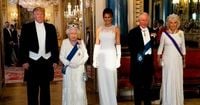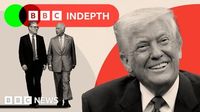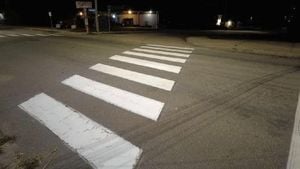President Donald Trump and First Lady Melania Trump touched down in the United Kingdom on Tuesday, September 16, 2025, embarking on a state visit that is already making history—and, inevitably, stirring controversy. This trip marks Trump’s second official state visit to the UK, a feat unmatched by any other elected political leader in modern times, and the first to be hosted twice by a British monarch. The visit, spanning Wednesday and Thursday, is loaded with symbolism, ceremony, and high-stakes diplomacy, all set against a backdrop of political intrigue and public protest.
The heart of the action this time is Windsor Castle, where King Charles III is rolling out the red carpet, joined by the Prince and Princess of Wales, William and Catherine. Unlike Trump’s first state visit in 2019, hosted by the late Queen Elizabeth II at Buckingham Palace, this occasion brings its own unique flavor. There will be gun salutes from Windsor and London, a carriage ride through the castle grounds—the first ever for a U.S. president—and a dramatic joint flyover by the Red Arrows and U.S. F-35 jets. The scale of ceremonial pageantry is immense: 1,300 troops and 120 horses are involved, far surpassing the numbers seen during President Macron’s earlier visit this year, according to BBC News.
But for all its grandeur, the visit is shadowed by the absence of Prince Andrew, whose ties to the late financier and convicted sex offender Jeffrey Epstein have become a political headache for both the royal family and the visiting American president. Adding to the diplomatic turbulence, Lord Mandelson was recently sacked as UK ambassador to the U.S. after emails surfaced revealing his close relationship with Epstein. Just days before Trump’s arrival, the Mandelson affair cast a pall over the proceedings, raising uncomfortable questions about political judgment and accountability on both sides of the Atlantic.
Planning for this whirlwind visit has been meticulous, with logistics and security at Windsor Castle reaching unprecedented levels. The castle has been transformed into a "ring of steel" to meet the exacting standards of the U.S. Secret Service, and even the location of the Household Cavalry was carefully chosen to avoid spooking horses with helicopter noise. The seating plan for the State Banquet in St George’s Hall has been the subject of intense negotiation, designed to foster off-the-record policy conversations between key players. The menu and music will feature nods to Trump’s Scottish heritage, and King Charles III’s seven-minute banquet speech has gone through multiple drafts to strike the right diplomatic tone. As one royal insider told BBC News, "The value of these things are not just the photo opportunities but also all the off-grid conversations."
Despite the careful choreography, the risk of diplomatic missteps looms large. Trump’s first state visit in 2019 was marked by public protests, a petition signed by more than a million people opposing his visit, and the now-iconic "Trump Baby" inflatable balloon. This time, protests are expected again, and the political climate is no less charged. According to a July YouGov poll cited by BBC News, only 16% of Britons hold a positive view of Trump, forcing the UK government to justify why such an elaborate welcome is worth the political price.
For the UK, the stakes are high. The government hopes to use the visit to secure economic advantages, such as a deal to exclude UK steel and aluminum from U.S. tariffs, and to finalize agreements on civil nuclear cooperation. Officials are also eager to announce a technology partnership that would see new investment in Britain and greater collaboration with Silicon Valley on artificial intelligence and quantum computing. These initiatives are being framed as domestic "wins" that align with the government’s growth agenda. As Lord Mandelson wrote in his outgoing letter to embassy staff, this technology partnership was his "personal pride and joy," and he claimed it would "help write the next chapter of the special relationship."
On Thursday, the focus shifts to Chequers, the Prime Minister’s country estate outside London, where Trump will meet with Prime Minister Sir Keir Starmer. The agenda is packed with pressing global issues: Russia’s aggression in Ukraine, NATO’s eastern flank, and the ongoing war in Gaza. The visit follows a February meeting at the White House between Starmer, Trump, and Ukrainian President Volodymyr Zelenskyy. Since then, as reported by ABC News, optimism about security guarantees has faded, and Russia’s recent violation of Polish airspace with drones has rattled European allies. Starmer is expected to press Trump on NATO’s mutual defense commitments—an area where Trump has sent mixed signals in the past—and to push for stronger sanctions on countries buying Russian oil.
The Mandelson controversy, however, threatens to overshadow these substantive discussions. The press conference at Chequers is likely to feature tough questions for Starmer about why Lord Mandelson was appointed ambassador in the first place, and why his dismissal took so long. Some diplomats worry that Trump might weigh in on Mandelson’s replacement, potentially putting No 10 in a difficult spot. As one Whitehall source confided to BBC News, "The most dangerous question for the Prime Minister may be why he thinks Lord Mandelson should be punished for his links to Epstein, but not the US President standing next to him." While officials note that Trump cut ties with Epstein well before his conviction, the issue lingers in the background.
Beneath the pageantry and politics, there are deeper tensions between the UK and U.S. governments. As one former British ambassador observed, "On values and policies, we have fundamental differences with the Trump administration – on NATO, Ukraine, Middle East and China. The differences are more profound than at any time since World War Two." The UK is reportedly set to formally recognize Palestinian statehood in an effort to keep the two-state solution alive, a move strongly opposed by the U.S. Secretary of State Marco Rubio, who recently reiterated America’s commitment "to fight anti-Israel actions including unilateral recognition of a Palestinian state that rewards Hamas terrorism."
Despite these challenges, many officials remain optimistic that the visit will proceed smoothly. Palace staff have described the Trumps as "warm and solicitous guests" during their previous visit, with Trump’s sense of humor reportedly appreciated by King Charles III. The overarching goal, as articulated by former Foreign Office chief Lord McDonald, is to ensure Trump leaves "warmly disposed to Britain," thereby enhancing the UK’s international standing at a time when global alliances are in flux.
As Air Force One prepares to depart on Thursday evening, questions will linger about the real impact of this historic state visit. Did the UK government play its royal card too soon, or will the spectacle and substance of the visit pay dividends for British interests? For now, the world watches as Windsor becomes the stage for a diplomatic drama that is as much about optics and symbolism as it is about forging the next chapter in the special relationship.





